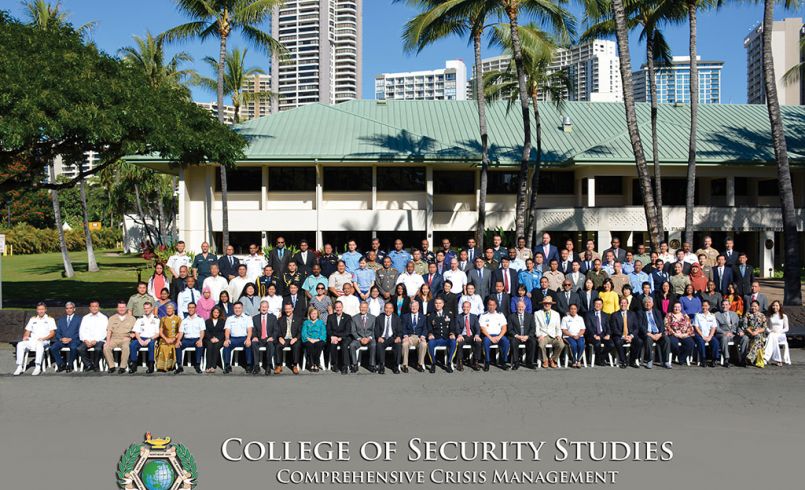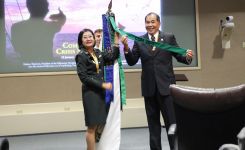- Daniel K. Inouye Asia-Pacific Center for Securi...
- CCM 19-1 concludes with 101 new Alumni!
CCM 19-1 concludes with 101 new Alumni!
One hundred and one Fellows from 36 locations completed the Comprehensive Crisis Management course (CCM 19-1) held at the Daniel K. Inouye Asia-Pacific Center for Security Studies (DKI APCSS) from Feb. 7 to March 13.
Managing crises involves a host of government and non-government actors, the military, the private sector, and affected populations that are often ethnically, politically and culturally diverse. Crises can be overwhelmingly complex due to myriad contributing factors, such as increased threat, urgency and uncertainty, interconnected processes, diverse stakeholder motivations, resource scarcity and inability to cope. The involvement of multiple ministries, national actors and foreign aid can make preparedness, response, recovery and resilience actions difficult, which speaks to the necessity of common operating platforms and well-established relationships.
“Thinking critically, systematically, and strategically were activities and lessons most valuable to me in this course,” explained one CCM Fellow.
Another Fellow had a different but equally relevant perspective on the course. (Due to DKI APCSS’ non-attribution policy, CCM Fellow’s names are not used in this article).
“[The exercises] taught me how to think outside the box and not always linearly.”
The course curriculum included site visits to Hawaii Emergency Management Agency, National Oceanic and Atmospheric Administration, Joint Typhoon Warning Center, Center for Excellence in Disaster Management, and U.S. Coast Guard. Further partnering occurred with the Pacific Disaster Center.
The CCM is five-week, annual executive education program designed to educate security practitioners in problem formulation, preparedness, response and resilience. The curriculum enhanced crisis capacity by developing a strong foundation in critical thinking, systems thinking, and strategic thinking, which were followed up by content on leadership, communication, negotiation and other relevant skills for enhanced crisis management and coordination.
Fellows had opportunities to analyze problems, explored factors that shape effective crisis management and developed comprehensive strategies and approaches through applied learning of best practices, case studies, small group discussions, exercises, situational games and an individual Fellow’s Project. A cohort from Tonga developed a project entitled, “Women in Peace and Security – National Action Plan Development,” which received great praise. Fellows, who were largely seasoned professionals from multidisciplinary backgrounds, shared their diverse expertise and experience in a participatory and trusting environment, which went a long way in assisting others in their projects and achieving learning outcomes of the course.
“Plenary and seminar discussions are all great, we have the luxury of time discussing all the topics and each of us has the chance of speaking and sharing their views and their contributions,” said another CCM Fellow.
In the post-course survey, the average Fellow rating for the course overall was 9.1/10 and presenters overall received 4.2/5. Self-rated knowledge of crisis management improved 69.4%, and capacity to manage crises comprehensively improved 84%. Fellows stated that they had learned skills they would be able to use in their work, they had built relationships with security practitioners from all over the region, their awareness of the value of multilateral coordination and multilateral engagement had increased, as had their awareness of critical capacity gaps in crisis management and HADR. They became more familiar with communication and coordination issues in domestic, international, civilian and military responders, and they applied this to working more effectively, rapidly and seamlessly with multiple stakeholders as they developed work plans or operating procedures or recommendations for crisis response.
Fellows identified threats on the ten-year horizon as being, in order of importance, weather-related disasters, political instability, geophysical disasters and transnational crime. Issues hampering effective management of the above crises were, in order of importance, instability, inadequate resources, insufficient long term planning, and lack of accountability & transparency.
More importantly, the course Fellows renewed their commitment to improving crisis and disaster management in their country or organization through their Fellows’ Projects and now have access to the 13000 strong APCSS alumni network.
CCM is one of five formal courses at DKI APCSS. The center is a Department of Defense institute that addresses regional and global security issues. Military and civilian representatives, most from the Asia-Pacific nations and the United States, participate in a comprehensive program of executive education, professional exchanges and outreach events, both in Hawaii and throughout the Asia-Pacific region.

The Center supports U.S. Indo-Pacific Command by developing and sustaining relationships among security practitioners and national security establishments throughout the region. DKI APCSS is one of the Department of Defense’s five regional security studies centers. Its mission is to build capacity and communities of interest by educating, connecting and empowering security practitioners to advance regional security. Since opening in 1995, more than 13000 alumni representing over 135 countries and territories have attended courses and workshops.
“My take away is that the world is complex, our problems are difficult and are only getting more difficult. However, courses like this, w/ 100 people from 40 countries is a shining reminder of the commonality and good that we can all share.”
-END-
See more photos on Facebook
Or in the CCM19-1 Group
Or on the DKI APCSS website




